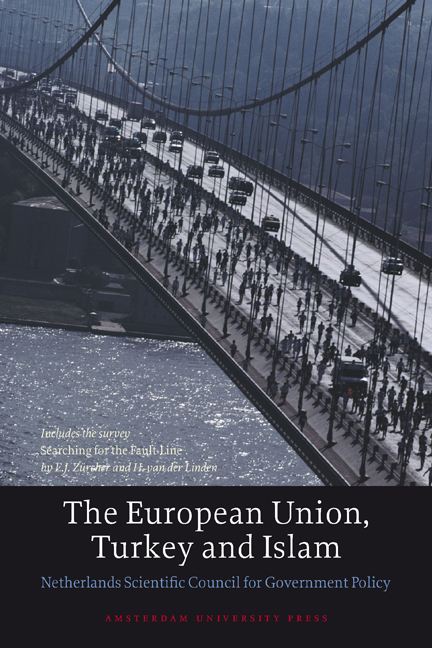Book contents
- Frontmatter
- Contents
- Summary
- Preface
- 1 Introduction
- 2 The European Union and Religion
- 3 Turkish Islam and the European Union
- 4 Conclusions
- Epilogue
- Literature
- Searching for the Fault-Line
- 5 Introduction: Turkey – Fault-Line, Frontline or Test Case?
- 6 Turkey’S Current Islamic Landscape
- 7 Turkish Islam and the Eu: a Clash of Civilisations?
- 8 Conclusion: Turkish Islam and European Civilisation
- Literature
- Websites
8 - Conclusion: Turkish Islam and European Civilisation
Published online by Cambridge University Press: 14 January 2021
- Frontmatter
- Contents
- Summary
- Preface
- 1 Introduction
- 2 The European Union and Religion
- 3 Turkish Islam and the European Union
- 4 Conclusions
- Epilogue
- Literature
- Searching for the Fault-Line
- 5 Introduction: Turkey – Fault-Line, Frontline or Test Case?
- 6 Turkey’S Current Islamic Landscape
- 7 Turkish Islam and the Eu: a Clash of Civilisations?
- 8 Conclusion: Turkish Islam and European Civilisation
- Literature
- Websites
Summary
The reader who has read the above chapters of this survey, will not be surprised by the conclusions that are drawn below.
We first showed in chapter 2 that Turkish Islam has a long tradition of symbiosis with the state, and that this tradition has given ‘official’ Islam in Turkey a strongly pragmatic and flexible character. Another important characteristic of Islam in Turkey is its wide range of expressions. We have examined this extensively, and have indicated the importance of Turkey's large Alevi minority, with its adherence to secular and humanist values. We have seen how the large Islamic movements in Turkey that are not tied to the state, overwhelmingly try to combine their faith in modern science and technology with traditional standards and values. This is true for both the classic Dervish orders and for the neo-movements. The fact that these traditional standards and values are seen and experienced as ‘Islamic’, does not mean those movements are fundamentalist. There are truly radical fundamentalist groups in Turkey, but these are marginal. Admittedly, the attitude of the Islamic majority towards Turkey's minute Christian and Jewish minorities is problematic. However, the fact that religious prejudices are diametrically opposed to the formal granting of equal treatment to all citizens, is not unique to Turkey. The same can be said of the attitude of Europeans to the Islamic minorities in Europe.
In chapter 3, we first tried to answer the question as to what extent Turkey is culturally a part of Europe. We began by concluding that the concept of identifiable civilisation blocs is not workable, and that the borders between civilisations are diffuse and porous. At the same time we stated that Turkey's modernisation has in effect also amounted to a long period of ‘EUropeanisation’, and that the legacies of Enlightenment and liberalism have also taken root in Turkey. From this point of departure, we answered the question whether Turkish Islam is compatible with political democracy and with the concept of human rights expressed in the European Convention and the United Nation's Convention. Analysis of core texts of both official state-Islam and of Islam-inspired political mass movements show unambiguously that this is indeed the case. The documents of the current governing party explicitly refer to these conventions and use European practices as a yardstick.
- Type
- Chapter
- Information
- The European Union, Turkey and Islam , pp. 169 - 170Publisher: Amsterdam University PressPrint publication year: 2004



